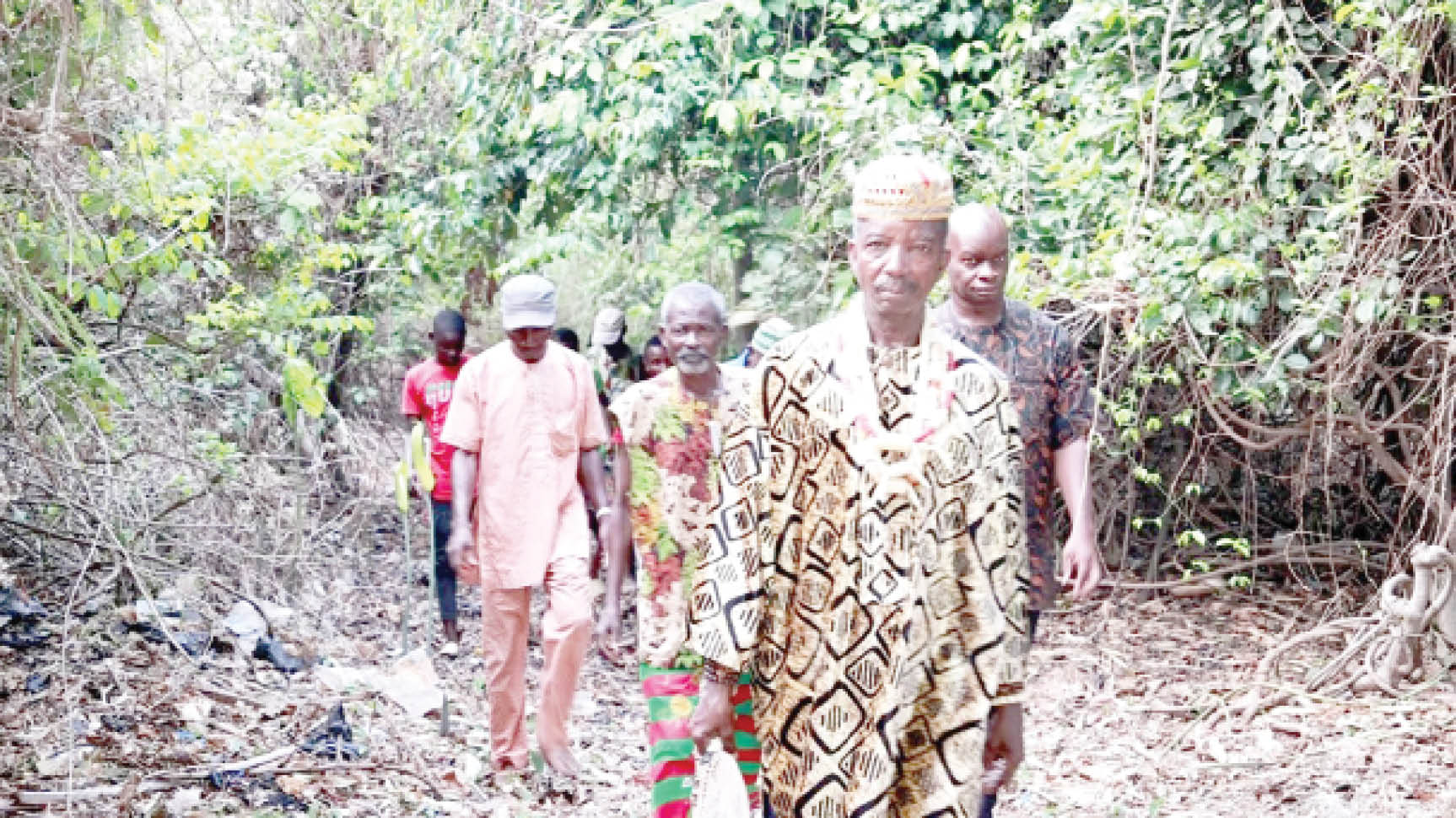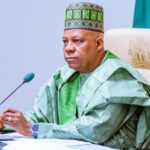There are numerous communities in Enugu State that are of Igala extraction, and they all look towards Idah in Kogi State with respect, Idah being the Igala cultural capital.
Up till now, some Igwes in Igboland receives their staff of office from the Attah Igala. This report also highlights the story of Onoja Oboni, an Igala giant who built the walls around Ogurugu. One account states that he attempted to divert the course of the River Niger with his bare hands.
Why Nigeria’s rich and famous should support Peter Obi
Enough of IGP, Police Commission power tussle
An Igala giant
In examining the story of Igala communities in Enugu State, it is impossible to ignore the fascinating narratives relating to Onoja Oboni, who from all indications, seems to have been above average in virtually everything. For instance, one account popular in Ogurugu states that he had 500 wives as well as 1,000 drummers. He is credited with extending Igala influence into large parts of Igbo land.
Onoja Oboni was said to have singlehandedly built the walls around Ogurugu, and to have ‘buried himself’ when he died. The remains of the walls are still visible today. He had six fingers on each hand, and six toes on each foot. History has it that he once attempted to stop the flow of the River Niger. The accounts are silent on why he, acting alone, wanted to do this.
However, the same sources are quite eloquent on the reason behind another attempt by him to construct a tower to the skies, with the intention of fighting the ‘people in the heavens.’ As the account put it very soon the tower collapsed, killing many.
When the history of giants who lived in the Nigerian region is to be written, the exploits of Onoja Oboni will most likely occupy one whole chapter in that work. The Igala are the 7th largest ethnic group in Nigeria according to Wikipedia.
The cultural and spiritual capital of the Igala is Idah in Kogi State, and Igala is part of the Kwararafa confederacy. The Igala live by the banks of the River Niger in Kogi State, are excellent rice and yam farmers, and have many rich festivals.
Ogugu Kingdom
Emmanuel Egwuaba is the Igwe of Ogurugu. He sheds some light on his community: “Where I am now is called Ogugu Kingdom. There are nine Ogugu communities; that is nine clans in this kingdom. These are Achanya, Obatamu, At’Idah, Okpale, Okpoto, Ofegbe, Ofuloko, Obaja and Edejo. The staff I am holding is the staff of Ogugu.”
Igwe Egwuaba tells Daily Trust on Sunday that a festival is held each year in honour of Onoja Oboni in Ogurugu, a community in Enugu State where Igala is still widely spoken today. It is taboo for women to be present at the site of the festival. A cow is usually slaughtered during the occasion. His grave or rather the area at its front is the venue for the event, and this is a forested part of Ogurugu.
A zinc covering shields the grave from the elements. Like the man himself, the grave has some traces of wonder like the fantastic weaving around it. It is said that once each year the soil around the grave swells beyond its normal size. Later in the year, the soil returns to its normal dimension.
Women not allowed
Obiechina Anthony is the secretary to the Igwe of Ogurugu. In an interview with Daily Trust Sunday he sheds light on the career of Onoja Oboni: “Onoja Oboni is an Igala person; his mother and father are from Igala. He was born and brought up in Ogurugu. As a stubborn person, his father drove him from home.
“His father was from Obatamu village in Ogurugu. He settled at At’Idah and they gave him land. Before he died, he said At’Idah will bury him. Since his father drove him away, nobody dug his grave. He dug his grave and he buried himself. Every year a festival holds to honour Onoja Oboni. Women are not allowed to enter, so they do not witness what is here.”
Unite the Igala
“Ane Igala Restoration is an organisation saddled with the responsibility of coordinating the rediscovery of all Igala groups…our people were scattered all over, and there was no connectivity. Those in Edo and Delta states, were being assimilated by other ethnic groups,” adds Ocholi Odekina the national president of the Ane Igala Restoration (AIR), a body set up to unite the Igala communities across the world.

Igala in 29 states
Herbert Nwanosike Ukuta is the Igwe of Igga. He tells Daily Trust Sunday, “AIR is a group of selected intelligent Igala people, given the mandate by the former Attah of Igala to bring all Igala together, wherever they live in this world, not physically dragging them, but making them understand that their root is Kogi State.
“We have discovered about 29 states that have Igala tribes in Nigeria, and outside Nigeria, we have Igala settlements.”
Odekina further explains: “Growing up in every Igala community, you come across people who exhibit supernatural powers. I want to believe that these things were handed down.
“You find these elements in some of the communities. People who possess these supernatural powers get things done singlehandedly. Onoja Oboni was one of such.”
Signs of Igbo impact
The legend of Onoja Oboni helps to shed light on Igala influence on Enugu State, and perhaps much further afield. Adiele Afigbo writing in Ropes of Sand, states that “Onoja Oboni is believed to have been a giant with six toes on each foot and six fingers on each hand.
“According to some accounts, he was a scion of the Idah royal house whose claim to the throne was through a female.”
Adiele goes on to write “If only scholars would look at the Igala side of the coin, they would discover Igala peoples and families bearing Igbo names as well as aspects of Igala society showing unmistakable signs of Igbo impact.”
‘Oboni, if you have extra’
Odekina also speaks on the legendary Igala giant: “Onoja Oboni was a giant, a physical giant. He had six fingers on each hand. He had these physical attributes going for him. Oboni is an Igala word which means a man with six fingers and six toes. That is the meaning of Oboni. If you are born today, and you have extra, you are named Oboni.’
‘Expansionist wars, power tussles’
Odekina traces the Igala dispersal out of their homeland. He states that there were wars, social and dynastic developments in Igalaland, which pushed Igala-speaking groups and influence into non-Igala speaking areas. These include areas in today’s South East.
He goes down memory lane and shows that there were movements out of Igalaland almost a thousand years ago. “This dispersal dates back to as far as 500 to 1000 years of this movement. Igala embarked on expansionist wars at some point, while also dealing with internal power tussles.
“Some dynasties are fading away, while some are about to take off. Like the case of Nimbo and communities in Enugu State, the movement of these people predates the Abuteje dynasty. Abuteje dynasty is the current ruling dynasty of the Attah Igala…That was how Igala kindred spread over time to all those places and in most of those communities, they were founded by the indigenous Igala people, like the Ibu in Delta State.”
‘Predominantly Igala’
Ukuta sheds light on the widespread Igala influence in the Nsukka area of Enugu State, covering areas such as similarities in names of plants and foods. “The entire Nsukka zone is predominantly Igala. Most of their traditions are Igala traditions. The names they bear are Igala names… They call pepper akpoko. Akpoko is an Igala word for pepper.
They call masquerades attah in most areas. The attah is Attah Igala they are referring to, not any other Attah. So, culturally, the whole Nsukka zone, comprising six local governments, has traditions that are very similar to those of the Igala.”
Rise of Idah
Afigbo takes a position in the work referred to when he comments on the trade between Idah, the middle belt and beyond. He writes, “It is not unlikely that the Igala played some part in this trade as middlemen between the Sudan and the South and that the wealth derived from this trade contributed in time to the rise of Idah.
“It would therefore be reasonable to surmise that it was during this period that the Igala made their first significant contact with the Northern Igbo, especially with the Nsukka people and the Igbo of Nri Awka – thus initiating those centuries of mutually beneficial contact which was to influence the cultural evolution of both groups so powerfully.’
‘Language of communication is Igala’
Ukuta explains why Igala is still widely spoken in Igga, his community, unlike other communities in the state with clear links to Idah: “We still interact, because once you cross the Imabolo river, you are heading to Kogi to go and buy fish or something. The language of communication is Igala.
“You cannot get any other place where they speak Igala, except in Igga, Ojoo and Ogurugu, all these being communities in Enugu State. These are the Igala-speaking communities, and they are all situated along the river bank.”
Ukuta comments on the numerous ceremonial beads of Igala origin, which he regularly wears, and which most communities of Igala extraction tend to use: “I inherited these beads from my grandfather. I don’t know where he inherited them from. He was born in 1904. My grandfather was the clan head of Ogboli, the community down Igga, our area… These are his beads.
“There are some I don’t wear, except it is a special occasion, and before I wear them, it has to be divinely inspired by the ancestors.”
‘When colonials came’
“It wasn’t their intention to leave Igalaland, it was when the colonial administration came. They brought the issue of boundary demarcation, the creation of states; many reasons behind creation of states…The Nsukka area is Igbo speaking, irrespective of the fact that the entire Nsukka land belongs to Attah.
“There is an adage in Nsukka to the effect that Nsukka is linked to Achadu… the entire Nsukka belongs to Attah,” adds Igwe Jude Okeke of Nkpunato Nkpologu, drawing attention to the Igala communities in Igboland.
‘Attah gives the staff’
He reasons; “In those days, if you are to be given a position as a traditional ruler, it must be the Attah who will give you the staff. You receive staff from the Attah before you become a traditional ruler. Even the Okanga, the drum they beat for a king, is derived from Igala. In those days before you get the Okanga, it must be prepared from the Attah…In those days, even the Eze Nkpologu, all these kindreds, got their staff from the Attah’s palace, even the beads. If you collect the staff, you don’t branch anywhere until you get to your house.
The name Nkpologu is an Igala name. Nkpologu means the front of anybody’s house. Nkpologu is meant for men.”
‘Idu is Igala for Lion’
Simeon Idu is the Igwe of Nkpologu Attah located in Uzo Uwani Local Government Area of Enugu State. He tells Daily Trust Sunday that there is one original Nkpologu in Idah, Kogi State, from where there were waves of migrations which led to the establishment of several other Nkpologus in various parts of Nigeria, including Enugu State.
He explains that his surname, Idu, means lion in Igala, and that his sister’s name, Ojoma, is an Igala reference to the Lord.
His words: “I just came into this world to find myself born in Nkpologu Attah. We are from Attah Igala. The origin of that Nkpologu is from Igala. There are other Nkpologus in Nigeria. I have not gone there, but I know they exist and some of them interact with others.
“There is Nkpologu in Idah and there are six other Nkpologu’s that I am aware of outside Igalaland. I know that Nkpologu Attah is from Idah.”
Offspring of Attah Eri
Odekina looks further east, and shows how the area of Aguleri in Anambra State was a long time ago also peopled by the offspring of Attah Eri. “There was an attah who reigned called Attah Eri which Igbos are calling Nri today. If you go to the Anambra plain, you will discover that the Aguleri area and all those areas are the root of the Igbo race.
“These people left Idah after that dynasty was dislodged. This was a pre-Abuteje dynasty. Some of these things happened around the 9th/10th century AD – the movement from Idah to Aguleri…There is a point you trace this ancestry to and you come to the realization that the Igalas and the Igbos at some point had some common ancestry.
“That is the time of Attah Eri whose sons left Idah and founded Aguleri, and all those areas.”
Odekina shows that there was a time, long ago, when the Igala were the lords of the Niger, ruling over it from Idah all the way to Onitsha in Anambra State. It is said that the Attah Igala had a powerful navy that ruled the Niger at one time.
Attah Igala sent representatives
Igwe Ukuta explains the relationship between his community and the Attah Igala’s palace, by referring to events that took place shortly after he was installed as Igwe. “The Attah before this one, I paid a courtesy visit to him to inform him that I have been installed as the traditional ruler of Igga. I went with some stakeholders. He received us, gave his blessings and was happy, very happy and promised to visit my community.
“In 1995, when my father translated, Attah sent representatives to the burial at Igga. They came in their numbers. That shows you that if you are an Igala traditional ruler in a different state, whatever you do you must relate to your ancestral home, because the Attah Igala is our spiritual head.”
‘Our chiefs in Enugu bear Igwe’
Odekina draws attention to the presence of Igala communities in many locations across Nigeria, beyond what some may regard as the regular borders of Igalaland. He mentions that there is an old Igala community in Rivers State. “Because of victimization, our chiefs in Enugu had to bear Igwe or Eze, for them to be recognised by the state government. This is not good. The fear of victimisation is making them readjust gradually, discard their original identity, and allow themselves to be assimilated. It’s not their fault…
When you get to Anambra, you discover that many of them retain their titles, but in Enugu, government policy towards them was so aggressive. So, they could not resist for too long… With the coming of Ane Igala Restoration, I believe that the awareness is returning, and gradually they are beginning to see that this is who we are.”

 Join Daily Trust WhatsApp Community For Quick Access To News and Happenings Around You.
Join Daily Trust WhatsApp Community For Quick Access To News and Happenings Around You.


